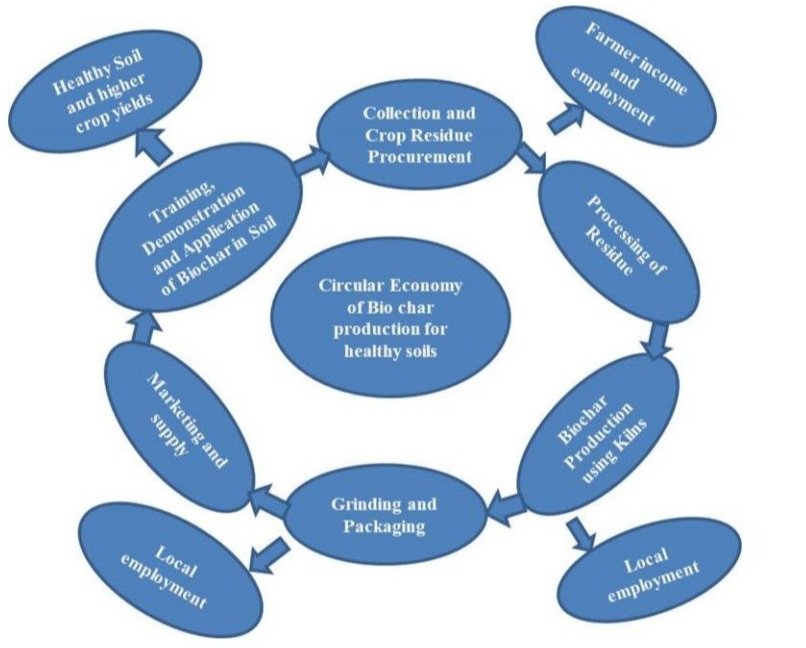Crop Residue Management for Healthy Soils
Context
Burning of unused crop residue is a common practice among farmers in India. Residue disposal in this manner contributes to carbon emissions and air pollution. This is a serious environmental problem in the Yavatmal District of Maharashtra where 405,000 ha of cotton and 106,000 ha of pigeon pea are grown annually. BAIF Development Research Foundation, with the support of Deutsche Gesellschaft für Internationale Zusammenarbeit (GIZ), established an enterprise to convert this residue into biochar through a farmer producer organisation (FPO). Farmers sell their waste biomass to the FPO and purchase biochar to apply to their crop fields.
Why biochar?
In recent times, farmers have reduced the use of organic manure and increased the use of chemical fertilizers, resulting in the depletion of soil organic carbon content. Over the years, soil quality has deteriorated. This degradation has resulted in low water holding capacity, microbial populations, the enzymatic activity of soil and many other problems. Biochar, a rich source of carbon, increases the carbon content and the water and nutrient-holding capacity of soil, besides improving several other soil properties. Produced locally from crop residue, the application of biochar increases the microbial population, enzymatic activity and soil fertility. Biochar application also increases the disease and drought resistance of crops.
Open air burning of cotton crop residue to clean the farm (Courtesy of BAIF)
Constraints in biochar production and application
Handling large volumes of crop residue which is laborious and difficult to transport
Lack of knowledge of farmers about biochar production technology
Resource barriers for farmers to purchase kilns and other production equipment
Biochar production requires full-time labour which individual farmers cannot afford
Therefore, the FPO was formed by local farmers and named TULJA Farmer Producer Company. The FPO operationalized the biochar enterprise, vermicompost production from farm residue, and the processing of pigeon peas. Member farmers pay dues for the operation of the FPO.
The FPO established a system of purchasing residue with a prefixed price per kilogram which attracted farmers to sell their residue to the FPO instead of burning it. The collected residue is processed into biochar through a pyrolysis process using kilns. Then the dried biochar is ground into fine particles and packaged. The FPO also organises farmers’ meetings to sensitize them on the hazards of burning residue and the benefits of using biochar. This has catalysed a market for biochar in the region.
In 2021-22, the FPO successfully converted 100 tons of crop residue into 25 tonnes of biochar. The biochar-making unit, which is run by the FPO, has created economical flow in the region as it involves many stakeholders in the process. The crop residue procurement also enabled farmers to earn income from farm waste which is otherwise burnt, leaving cleanup up to the farmer. At the same time, the waste is recycled back into the soil. The converted fine particle biochar is then sold to the FPO members and other farmers in the locality which generates some income for the FPO. The FPO can then expand their operations and other activities in their portfolio which in turn adds to their profits and can be leveraged to its members. In this way, farmers benefit directly and indirectly.
Farmers’ perceptions are encouraging as they have realised the benefits of using biochar. The farmers who have used it have reported a reduction in the cost of production and also increased yields. Farmers from neighbouring villages visited the production unit and application plots and witnessed the results in demonstration plots. Some farmers have even started scaling the use of biochar on their own.
The benefits of biochar application can be realised in the long term as the cost of application is broken down over the years and it is considered as an investment. The farmers are compensated for the cost of biochar application as it reduces the rate of fertilizer application and soil nutrient holding improves. Some farmers with extensive land holdings have found it expensive to start out but report that they are willing to apply it if support is provided.
The production process and field application of biochar is shown below:
(Courtesy of BAIF)
Demonstration plots
Biochar was applied to wheat and gram crops after being mixed with an equal quantity of compost before sowing. Biochar was also treated with beneficial microbes before its application. To study the effect of biochar on soil properties and crop yield, the observations related to soil and crop parameters were recorded following standard procedures. The soil samples were collected and tested for various properties, namely pH, electrical conductivity, organic content, available nitrogen, phosphorous and potassium, before biochar application and again after harvest in both demonstration and control plots. Crop yield data were recorded as well. From the results, it was observed that due to biochar application, the yield of wheat and gram increased by 12.59 % and 13.44 %, respectively, from the application of biochar.
Way forward
Marketing of the biochar produced by the FPO through sensitizing farmers through training and demonstrations is very important for the sustainability of the FPO
Support is needed for farmers to make the transition to biochar use and to realise its benefits on soil health
Biochar production technology can further reduce the cost of production
The biochar application trials are also being conducted at BAIFs research campus to standardise application rates - the microbial-enriched biochar is also undergoing for marketing and awareness creation for farmers who visit the BAIF campus
The BIOPROM (Phosphate Rich Organic Manure) from biogas slurry and its application to improve soil is another important best practice being promoted by BAIF based on the circular economy concept
BAIF is committed for the sustainable livelihood development through its Research and development programmes in India. Climate actions through its core programmes are addressing land degradation and soil health, carbon sequestration through agri-horti-forestry model (Wadi) and methane emission reduction through management of Livestock. For more information: https://baif.org.in




